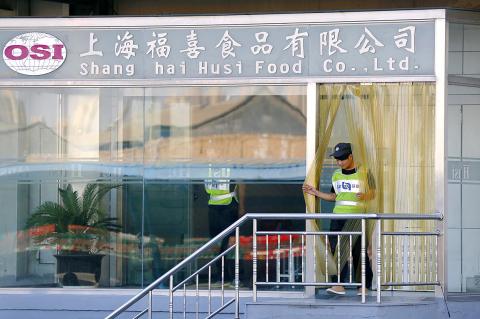The parent company of a scandal-hit Chinese food supplier said it is withdrawing all products made by the subsidiary.
Shanghai Husi Food Co Ltd (上海福喜食品), a unit of US-based OSI Group LLC, is at the center of a major food safety scandal, which has spread from China to Hong Kong and Japan, over allegations it mixed fresh and expired meat.
In a statement posted on its Web site on Saturday, OSI Group said it would “withdraw from the marketplace” all products made by Shanghai Husi, and that it was conducting an internal investigation into current and former senior management.

Photo: Reuters
It vowed to take “swift and decisive action” including legal measures against those responsible for the scandal and said a new management team would be brought to China.
Regulators in Shanghai said on Saturday that Husi had forged production dates on smoked beef patties and then sold them after they expired.
OSI Group said it would fully cooperate with Chinese regulators.
Chinese police have detained five people as part of the investigation.
The scandal, which has dragged in global food brands, including McDonald’s Corp, KFC’s parent Yum Brands Inc and Starbucks Corp, was triggered by a local television report last week showing staff at Shanghai Husi using long-expired meat. The report also alleged the firm forged production dates.

To many, Tatu City on the outskirts of Nairobi looks like a success. The first city entirely built by a private company to be operational in east Africa, with about 25,000 people living and working there, it accounts for about two-thirds of all foreign investment in Kenya. Its low-tax status has attracted more than 100 businesses including Heineken, coffee brand Dormans, and the biggest call-center and cold-chain transport firms in the region. However, to some local politicians, Tatu City has looked more like a target for extortion. A parade of governors have demanded land worth millions of dollars in exchange

An Indonesian animated movie is smashing regional box office records and could be set for wider success as it prepares to open beyond the Southeast Asian archipelago’s silver screens. Jumbo — a film based on the adventures of main character, Don, a large orphaned Indonesian boy facing bullying at school — last month became the highest-grossing Southeast Asian animated film, raking in more than US$8 million. Released at the end of March to coincide with the Eid holidays after the Islamic fasting month of Ramadan, the movie has hit 8 million ticket sales, the third-highest in Indonesian cinema history, Film

Taiwan Semiconductor Manufacturing Co’s (TSMC, 台積電) revenue jumped 48 percent last month, underscoring how electronics firms scrambled to acquire essential components before global tariffs took effect. The main chipmaker for Apple Inc and Nvidia Corp reported monthly sales of NT$349.6 billion (US$11.6 billion). That compares with the average analysts’ estimate for a 38 percent rise in second-quarter revenue. US President Donald Trump’s trade war is prompting economists to retool GDP forecasts worldwide, casting doubt over the outlook for everything from iPhone demand to computing and datacenter construction. However, TSMC — a barometer for global tech spending given its central role in the

Alchip Technologies Ltd (世芯), an application-specific integrated circuit (ASIC) designer specializing in server chips, expects revenue to decline this year due to sagging demand for 5-nanometer artificial intelligence (AI) chips from a North America-based major customer, a company executive said yesterday. That would be the first contraction in revenue for Alchip as it has been enjoying strong revenue growth over the past few years, benefiting from cloud-service providers’ moves to reduce dependence on Nvidia Corp’s expensive AI chips by building their own AI accelerator by outsourcing chip design. The 5-nanometer chip was supposed to be a new growth engine as the lifecycle